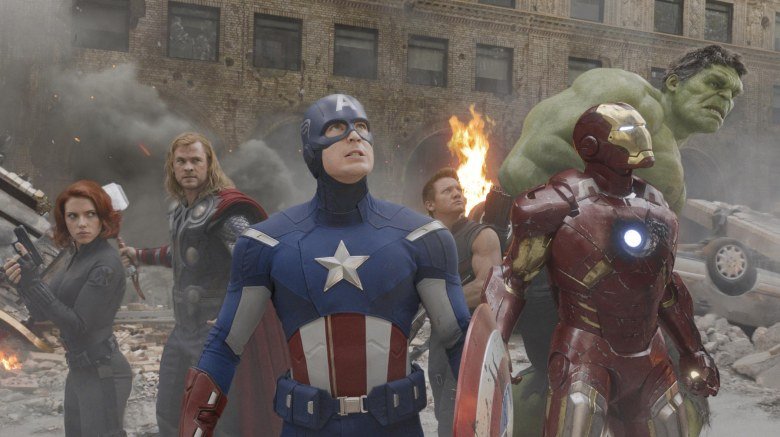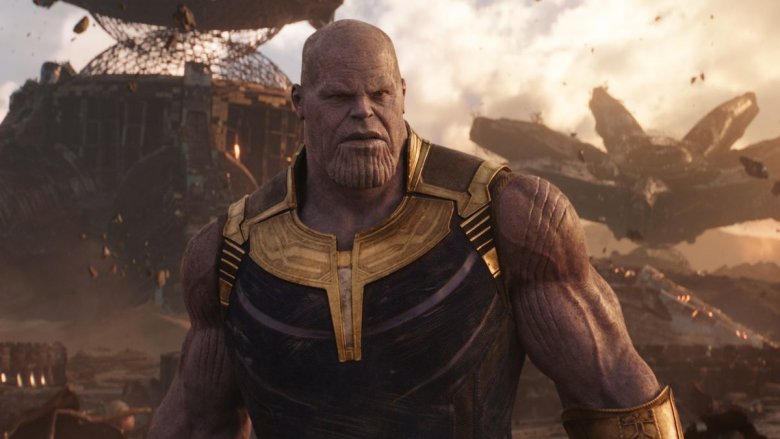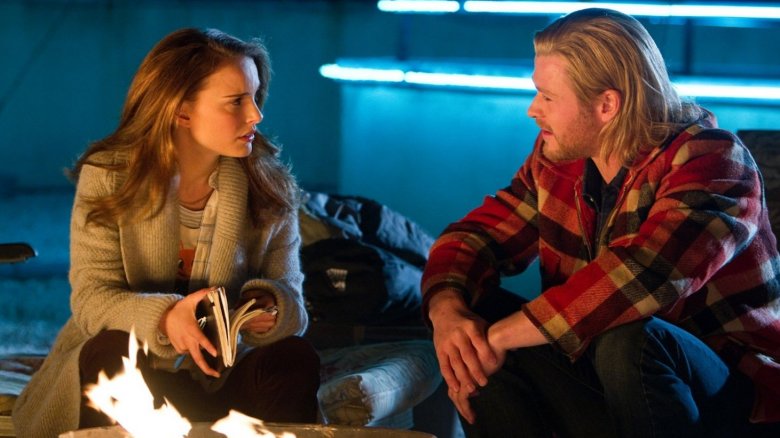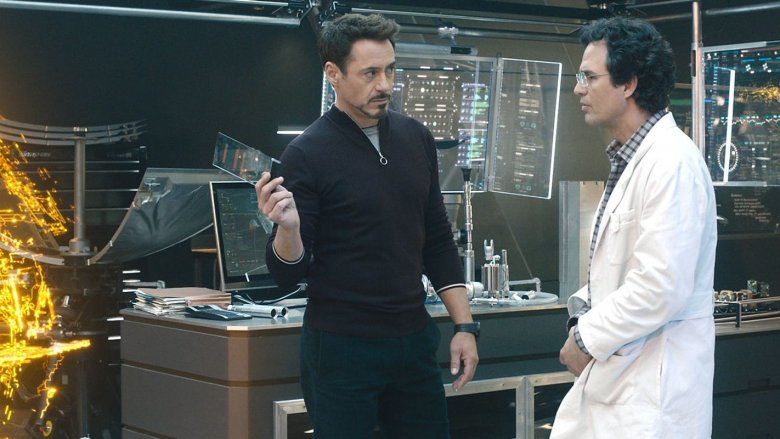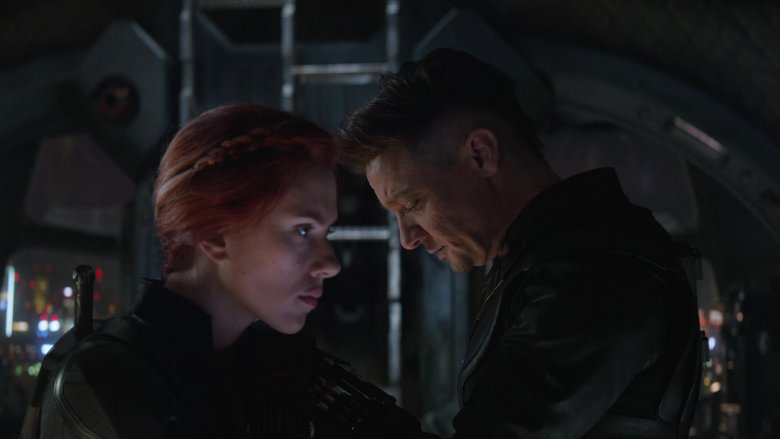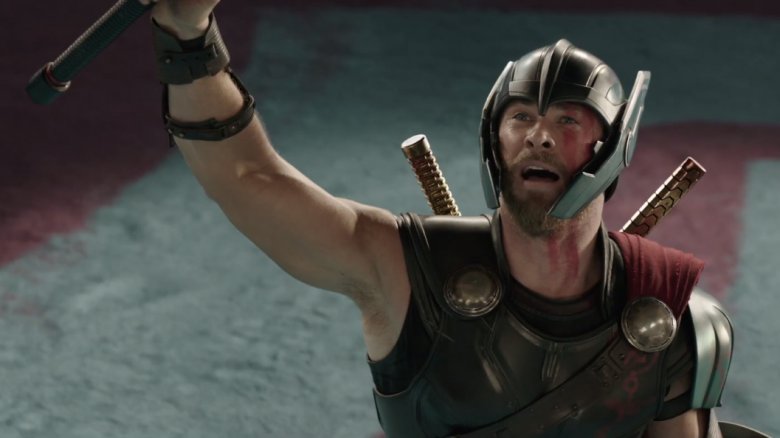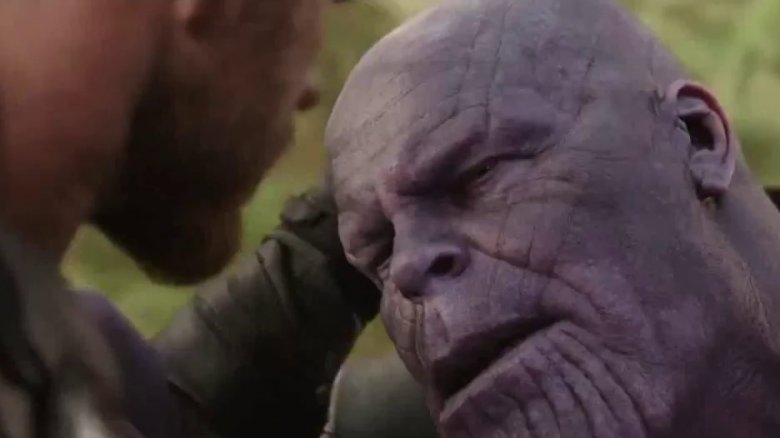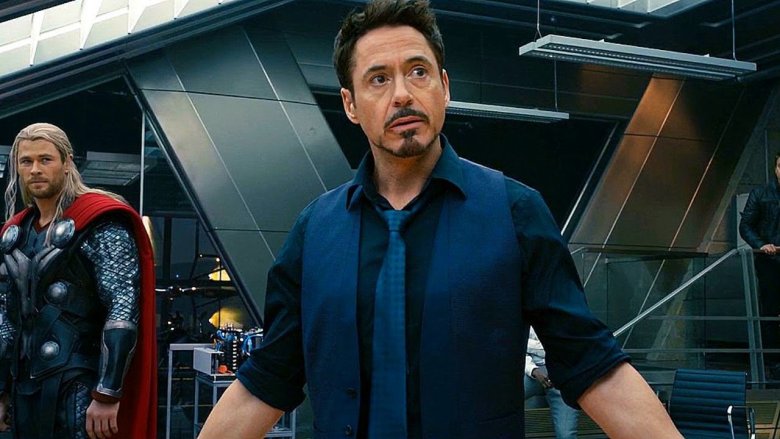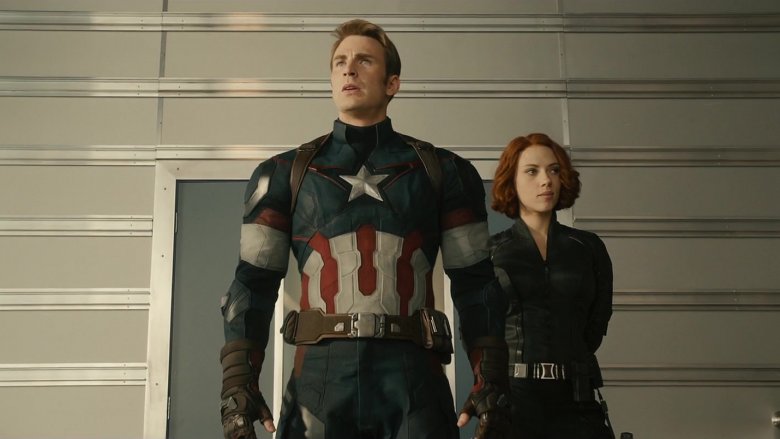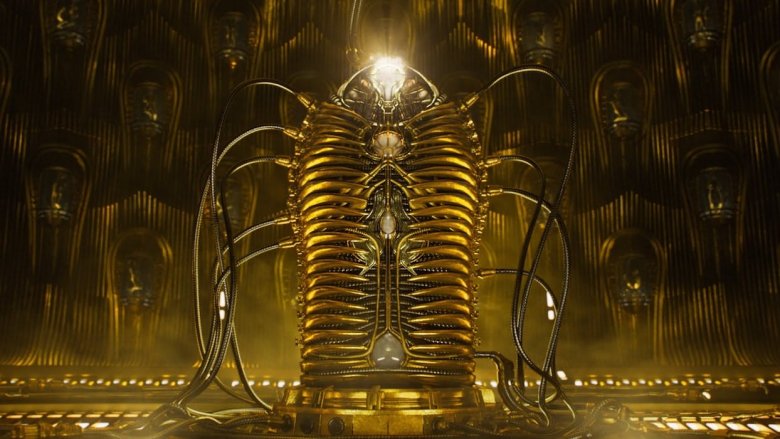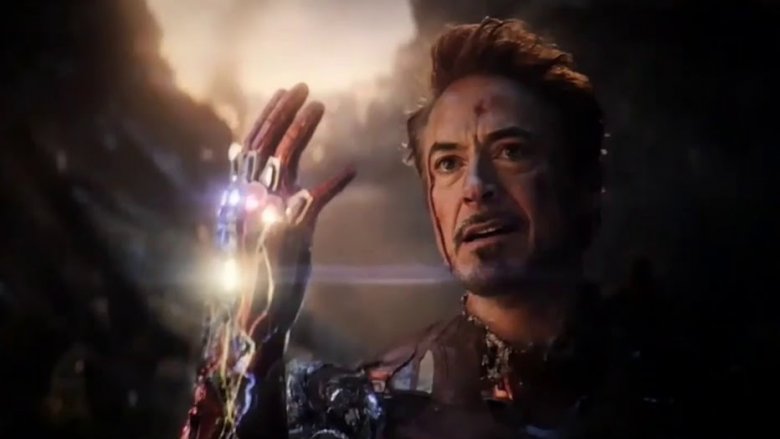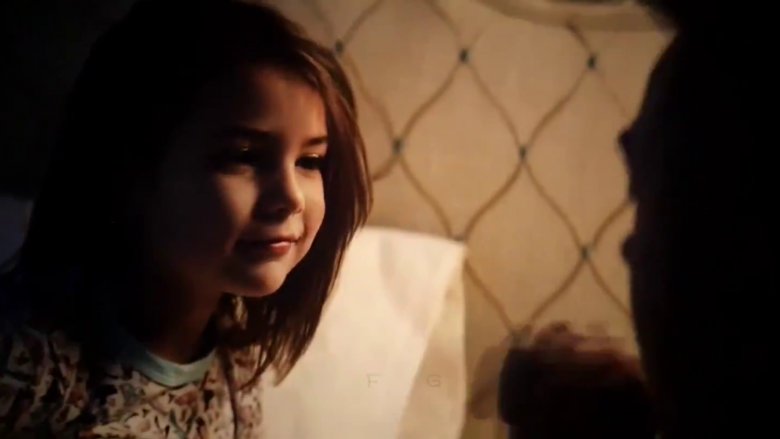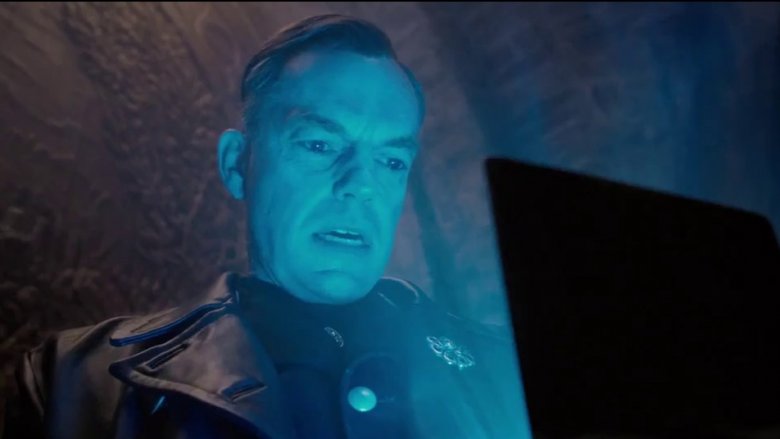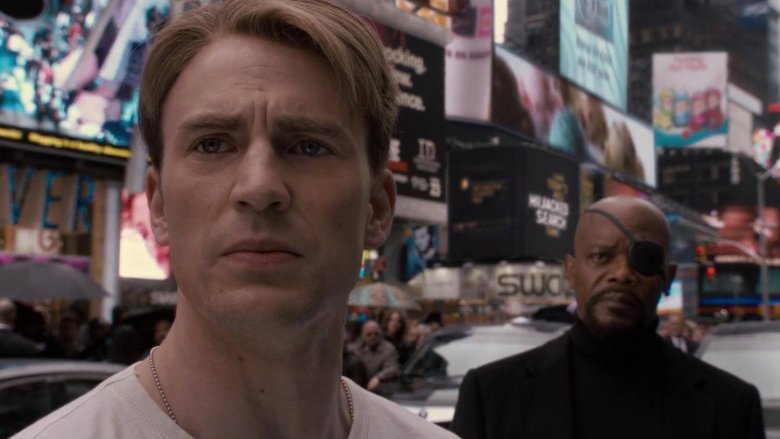Lines In MCU Movies That Mean More Than You Realized
The Marvel Cinematic Universe is a complicated place. Crossovers are par for the course, everyone is referencing other stories and franchises all the time, and every spoken line is analyzed and picked apart by fans to search for any possible deeper meaning. This intense scrutiny often ends with little more than hopeful fan theories that peter out as other information unfolds. But just as often, it turns out that a line absolutely hinted at something deeper and more meaningful.
Sometimes that deeper meaning is associated with a previous scene or movie in the superhero universe. Other times, it's a clue about events or characters to come. Still others have nothing to do with the MCU at all but are referring to personal jokes, comic book callbacks, and other forms of fan service. We've gathered a list of some of the most sneakily significant lines ever uttered in the MCU, along with a breakdown of the deeper meaning behind each one.
Cursed with knowledge
In Avengers: Infinity War, Tony Stark confronts Thanos on Titan, only to be addressed by name. When he asks if the Mad Titan knows him, Thanos responds, "I do. You're not the only one cursed with knowledge." The line is clearly dripping with deeper meaning, but the obvious question is, how does Thanos know Tony Stark?
The commentary track for the movie answered that question when screenwriter Christoper Markus explained, "You realize this interesting parallel between Thanos and Tony. They're both aware of something from an early point and constantly having to deal with being smarter. Thanos is a futurist as much as Tony Stark." The connection between the two, while it has its limits, certainly explains why the Mad Titan would gravitate toward Stark as a fellow being that struggles with the "big issues."
But what about the fact that he addressed him by name? Co-director Joe Russo cleared that one up by explaining that Thanos is "aware of Stark from the original Battle of New York as the person who undid the plan." This double whammy of Stark initially getting Thanos' attention with a nuke and then connecting with him as a fellow genius certainly goes a long way in explaining why the Mad Titan would have such respect for his opponent.
One and the same
Phase one of the MCU was a formative time as many of the basic elements and unofficial laws of how things work were established and fleshed out. One of those "unofficial laws" has to do with the difference between magic and science, and it's initially laid out by Thor during his first solo outing. At one point in the movie, the God of Thunder and Jane Foster have a conversation in which Thor explains that "Your ancestors called it magic, and you call it science. Well, I come from a place where they are one and the same thing."
The line, uttered while the two characters are making eyes at each other, is deceptively important under the surface and ends up being a huge mantra going forward. It doesn't matter if you're dealing with Infinity Stones, vibranium from Wakanda, or pretty much anything Doctor Strange does, most "magical" moments are eventually explained away in scientific terms at some point or another. Whatever the situation, there's no doubt at this point that the overlap between science and magic has firmly embedded itself as one of the MCU's guiding principles.
A global suit of armor
At one point in Avengers: Age of Ultron, Tony Stark and Bruce Banner are seen discussing a new form of artificial intelligence recovered from Von Strucker's HYDRA-backed research. The two debate as Stark insists that he wants to harness the potential power of the AI in order to run his Iron Legion as a form of protection for the world. Remember, this all takes place after the group defends earth from an invasion of Chitauri aliens in Avengers. It also comes after Stark is given a disturbing vision by Scarlet Witch in which he sees death and destruction, brought on by another galactic attack.
At one point in the conversation, he says, "I see a suit of armor around the world." The line slips by fairly quickly and is mostly forgotten after Ultron emerges and becomes a threat. But the idea of a global "suit of armor" as protection against extraterrestrial threats never quite disappears. In fact, Stark's dream of defending the Earth becomes a primary theme in his gradually unfolding showdown with Thanos, as the Iron Avenger attempts to do everything in his power to stop the Mad Titan. The idea even resurfaces in Avengers: Endgame, when Stark angrily berates Steve Rogers for having resisted his plan for a suit of armor around the world in the first place.
Friends forever
The relationship between Natasha Romanoff and Clint Barton is legendary at this point. But it's never on better display than it was during the airport fight scene in Captain America: Civil War. As all the heroes split off and fight each other, who should find themselves face to face but the pair of ex-S.H.I.E.L.D. agents. They engage in a pleasantly entertaining, comparatively low-energy duel that's interrupted when Scarlet Witch tosses Black Widow aside and calls out Barton for "pulling his punches."
Initially, Barton gains the upper hand and pins his opponent to the ground, at which point Romanoff pauses to ask, "We're still friends, right?" Barton shoots back, "Depends on how hard you hit me." The scene is a lighthearted break from the serious events of the film and showcases the enduring friendship of the duo. However, it isn't until Avengers: Endgame that the gravity of those lines really hits home. When Romanoff and Barton head to Vormir, it turns out that their love for each other is exactly what is needed in order for Black Widow to give her life in order to gain the Soul Stone — an event that also involves some hard hitting as they fight over who will make the sacrifice. If their relationship, built over years of camaraderie, hadn't been so strong, they likely never would have gotten the Stone in the first place.
A friend from work
One of the best sequences in the entire MCU takes place during Thor's time on Sakaar in Thor: Ragnarok. Each scene is filled with tongue-in-cheek slapstick humor as Thor, a.k.a. Sparkles, finds himself trapped by the Grandmaster and forced to fight his champion. Fortunately, that champion ends up being none other than Thor's old friend and unintentional sparring partner, Hulk.
Thor's reaction, when he sees the Jade Giant enter the arena, is priceless. His look of concern melts away as he cheers. Turning to the Grandmaster, he waves and informs him that the two combatants know each other, adding, "He's a friend from work." It's already one of the funniest lines in the entire movie, which is saying something. But the background behind how it came into being makes it even better.
It turns out the line wasn't invented by the writers, director, or even Thor star Chris Hemsworth. In an interview with Entertainment Weekly, Hemsworth explained that what is arguably the most iconic line from the entire movie was actually thought up by a child from the Make-A-Wish Foundation, who was on the set when they filmed the scene. Priceless.
Go for the head
When Thanos plucks the Mind Stone out of Vision's head in the waning moments of Infinity War, his victory seems both imminent and inevitable. That is, until Thor suddenly arrives, hurling Stormbreaker at the unsuspecting villain and catching him off guard. The weapon strikes him in the chest, and Thor drops down in its wake in order to gloat in his apparent victory. But of course, we all know what happens next: Thanos utters the seven famous words "You should have gone for the head."
While the repercussions of that line are pretty obvious, there's one hidden side effect that isn't quite so easy to spot. Obviously, Thor's choice to prioritize his own gloating over simply killing Thanos on sight meant half of the universe perished and all of the pain and loss of Avengers: Endgame had to follow. But another unexpected result came in the form of Thor's physical appearance and dejected condition in the fourth Avengers film. In the beginning of the movie, Thor ends up "going for the head," decapitating a helpless Thanos in a fit of angry vengeance. But, as writers Markus and McFeely pointed out, that very action turns out to be a failure that breaks his will completely.
In other words, you can draw a straight line from Thanos' words to Thor's vengeance, and on to his dejection and depression in Avengers: Endgame.
The Endgame
Another important line that comes from Tony Stark in Avengers: Age of Ultron is short, sweet, and incredibly far-reaching. When the Avengers team discovers that Stark has inadvertently created Ultron while trying to put his "suit of armor around the world," the team goes back and forth over the issue. The conversation peaks when Stark declares, "We're the Avengers. We can bust arms dealers all the live long day, but that up there, that's the endgame. How were you guys planning on beating that?" In typical Captain America fashion, Steve Rogers replies "Together," to which Stark rejoins, "We'll lose." Rogers then shuts down the conversation with the final line, "Then we'll do that together, too."
The words continue to ring true far beyond Age of Ultron. Not long afterward, Captain America: Civil War sees the team splinter, an event that is eventually followed by Infinity War and Endgame. And it's here that the conversation resurfaces at two different points. First, at the end of Infinity War, Doctor Strange makes a veiled reference to the heroes being "in the endgame now," harkening back to Stark's cosmic declaration. But it doesn't stop there. In the opening minutes of Avengers: Endgame, Stark angrily confronts Captain America for allowing the group to splinter rather than provide a unified front, arguing that they did end up losing — and they didn't do it together.
Avengers, Assemble
One of the most iconic lines from Marvel Comics is "Avengers assemble!" The phrase was anxiously anticipated throughout the first Avengers film but never surfaced. In Avengers: Age of Ultron, it became clear that director Joss Whedon was studiously avoiding the line, even going so far as to have the last word of the entire movie be Captain America saying "Avengers..." and then cutting the scene off — he literally didn't even film Chris Evans saying the entire phrase, just to make sure it didn't end up being included at the last minute.
All of which serves to underscore why it was a pretty big deal when, at the climax of his Avenging career, Captain America finally, at long last, uttered those two words before the decisive battle at the end of Avengers: Endgame. Surrounded by a host of heroes who had just joined him at the last second via a myriad of sling rings, it was the absolute perfect time for the phrase to finally find its way onto the big screen.
Adam
Guardians of the Galaxy Vol. 2 is a fun trip that follows the Guardians team as they grow closer as a family, introduces Mantis, reboots Groot as Baby Groot, and sees Yondu Udonta pull a Mary Poppins. It also has an important teaser at the very end of it all in the form of a new character.
One of the film's end credits scenes shows Ayesha, the High Priestess of the Sovereign, as she is about to be held accountable by the Sovereign Council for wasting resources. She has one last trick up her sleeve as she predicts, "When they see what I have created here, their wrath will dissipate," referencing an elaborate golden birthing pod that rests before her. What's inside? According to Ayesha, nothing short of "The next step in our evolution. More powerful, more beautiful, more capable of destroying the Guardians of the Galaxy. I think I shall call him Adam."
The person being referenced is the powerful Adam Warlock, a comic book character that has been looked for onscreen by Marvel fans for quite a while now. Chances are we'll see Warlock sooner rather than later, as Guardians of the Galaxy 3 is officially on the docket. Not only that, but James Gunn is back to helm the project, giving Warlock an even greater likelihood of getting in on the action — he's a favorite character of the director.
I am Iron Man
Four words. "I am Iron Man." We're used to hearing them, but when one stops to think about their impact on Tony Stark's storyline, not to mention the MCU as a whole, it's a bit staggering. Right from the get-go, Tony Stark was drawn toward the phrase, uttering it during his first solo outing to the amazement of a room full of reporters. The line shows up again in Iron Man 3, this time expanded: "You can take away my house, all my tricks and toys. One thing you can't take away? I am Iron Man."
The words are a rallying point for Stark's identity. They're a way to sum up his entire persona. It's also a concept that comes to its ultimate fruition at the very end of the Infinity Saga. After all the dramatic events in the war with Thanos, as he kneels, with the Infinity Stones in hand and his fingers ready to snap away the Mad Titan's entire existence, what four words does Stark choose to use? "I am Iron Man." 'Nuff said.
Three thousand
While Tony Stark's "I am Iron Man" mantra is instrumental in his journey to save the universe from annihilation, it's not the only phrase that he's keen to repeat. Another one that he picks up later in life is the endearing phrase, "I love you 3,000." Audiences hear the line when Stark's daughter, Morgan, tells him that she loves him "three thousand" as he puts her to bed in Avengers: Endgame. The ever-witty Stark grabs onto the randomness of the number and trumpets his superior score to Pepper in the following scene. It even reemerges when they play back his final message after his death, with one of his last statements to his loved ones being "I love you 3,000."
So who came up with the whole "3,000" bit in the first place? It turns out, the scene is modeled after one of Stark actor Robert Downey Jr.'s own personal life experiences. At one point, he informed Endgame directors Joe and Anthony Russo that one of his own children had told him that that's how much they loved him. Apparently the directors were so touched by the story that they incorporated it into the film.
Digging for trinkets
In the early moments of Captain America: The First Avenger, the Red Skull is shown leading a raid on a Norwegian village in search of the Tesseract. The cube, secretly containing an Infinity Stone, ultimately ends up going on to play a key role in Captain Marvel's origin story before it's used by both Thanos and the Avengers during the events of Infinity War and Endgame. But it doesn't take those world-shaking events for the Nazi villain to understand what he has in his possession.
As he stands looking at the stone in amazement, Red Skull simply utters, "And the Fuhrer digs for trinkets in the desert." The line could very well be a reference not only to Hitler's fascination with the occult, but specifically the plot of the Indiana Jones movies, which feature Nazis searching for both the Ark of the Covenant and the Holy Grail in the desert. Do Indy's adventures secretly take place within the MCU? Either way, referring to a relic that can melt your face off as a "trinket" is a pretty bold way to let savvy audience members who picked up on the line know that they're dealing with some pretty powerful stuff.
"I had a date"
Captain America: The First Avenger ended up being a critical part of the MCU, as it set in motion one of the most important storylines of the entire Infinity Saga. The story traced Steve Rogers on his path from a physically weak, morally strong young man to a full-blown super-soldier with the weight of the world on his shoulders. But, for all of the heroics, one of the best lines in the entire film wasn't about Rogers the superhero as much as Rogers the romantic.
As the film's World War II action wraps up, Rogers wakes up nearly 70 years in the future, having spent the last several decades in an ice-induced coma. Bewildered, the hero runs out into a bustling city street and is confronted by none other than Nick Fury, who informs him of how long he's been asleep. He looks around, taking in the shocking news that everything he ever knew lies three-quarters of a century in the past.
"Are you going to be okay?" Fury asks. Rogers responds, "Yeah. Yeah, I just... I had a date," referencing his romantic relationship with Peggy Carter, which had so suddenly been cut off. While the line was moving on its own, it ultimately meant quite a bit more when Avengers: Endgame rolled around. At the end of that film, Rogers heads back in time, blowing past his timestamp in order to finally, at long last, fulfill that date with Agent Carter.
